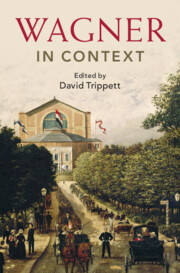Book contents
- Wagner in Context
- Composers in Context
- Wagner in Context
- Copyright page
- Contents
- Illustrations
- Musical Examples
- Contributors
- Acknowledgements
- Abbreviations
- Introduction
- I Place
- II People
- Chapter 9 Franz Liszt
- Chapter 10 Nietzsche and Wagner: The Logic of Contradiction
- Chapter 11 Wagner, Schopenhauer, and the World as a Phantasmagoria
- Chapter 12 Assessing Wilhelmine Schröder-Devrient: Influence, Genre, and Voice
- Chapter 13 Cosima Wagner
- Chapter 14 The Wagner Family: Rebellion, Honour, Aftermath
- III Politics, Ideas, and Bodies
- IV Life, Language, and the Ancient World
- V Music and Performance
- VI Reception
- Further Reading
- Select Bibliography
- Index
Chapter 10 - Nietzsche and Wagner: The Logic of Contradiction
from II - People
Published online by Cambridge University Press: 14 March 2024
- Wagner in Context
- Composers in Context
- Wagner in Context
- Copyright page
- Contents
- Illustrations
- Musical Examples
- Contributors
- Acknowledgements
- Abbreviations
- Introduction
- I Place
- II People
- Chapter 9 Franz Liszt
- Chapter 10 Nietzsche and Wagner: The Logic of Contradiction
- Chapter 11 Wagner, Schopenhauer, and the World as a Phantasmagoria
- Chapter 12 Assessing Wilhelmine Schröder-Devrient: Influence, Genre, and Voice
- Chapter 13 Cosima Wagner
- Chapter 14 The Wagner Family: Rebellion, Honour, Aftermath
- III Politics, Ideas, and Bodies
- IV Life, Language, and the Ancient World
- V Music and Performance
- VI Reception
- Further Reading
- Select Bibliography
- Index
Summary
Friedrich Nietzsche’s relationship to Richard Wagner and his music was complex, contradictory, even paradoxical. Neither Nietzsche’s emphatic allegiance to Wagner in his early years nor his later rejection should be taken literally. The revaluation of the performative moment in cultural analysis is part of a core of thoughts that Nietzsche chewed over again and again from his first years in Basel until his collapse in Turin. His conception of the Attic tragedy is based on the assumption that the tragedy must be considered in the original context, with its cultic background and performative outcome, as opposed to the reduction of the drama to a written text, as introduced by Aristotle and continued by the Alexandrian philologists. It is here that Nietzsche demonstrates the most in common with Wagner. Yet for Nietzsche, performativity becomes a type of thinking and writing through which he ultimately distances himself from metaphysical thinking and from Wagner.
Keywords
- Type
- Chapter
- Information
- Wagner in Context , pp. 104 - 112Publisher: Cambridge University PressPrint publication year: 2024

